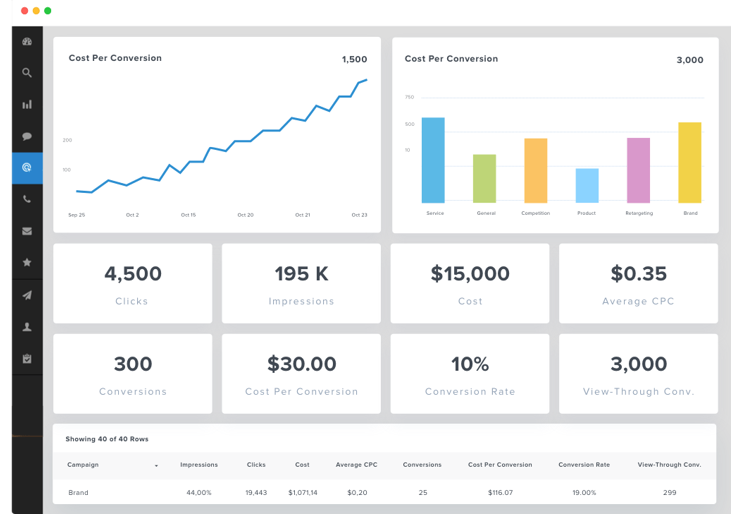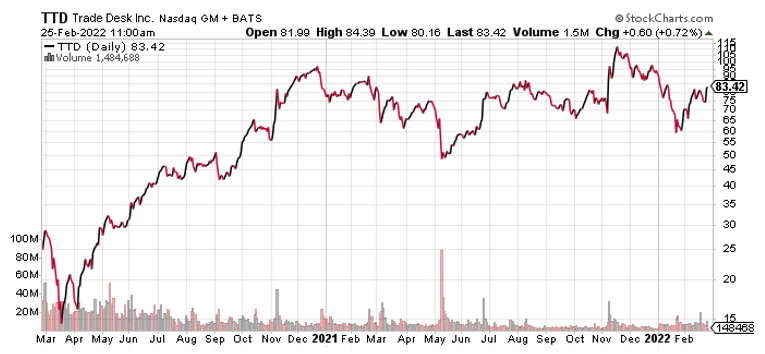There’s one major thing that investors need to make sure they’re doing … and that’s differentiating the winners from the losers.
Understanding big trends is an important part of successful investing, yet the real alpha comes from separating the contenders from the pretenders.
This difference was on full display last week as early pandemic winners The Trade Desk (TTD) and Roku (ROKU) reported fourth-quarter financial results.
The two digital media businesses, which both focus on ads, are headed in completely opposite directions.
- One’s ascending to greater heights, while the other’s headed for a nosedive. But let’s be clear ... the digital-ad industry is still very, very strong.
From Alphabet (GOOGL) to Snap (SNAP) and The Trade Desk, more brands are pushing their advertising dollars to digital channels.
- And it makes sense. The results can be measured, as opposed to the analog alternatives. It’s where the future is headed … and still at a furious rate.
Smooth-talking Madison Avenue salespeople have always conflated successful advertising with proliferation.
The idea was to interrupt potential customers with distractions — the more, the better.
These spots showed up on radio, television, outdoor billboards and later the internet … yet there was no way to measure success.
Companies like Google made it easier for ad buyers to target potential customers.

Not only did a search for raincoats find relevant manufacturers, but it also allowed ad buyers to specifically target those patrons with relevant ads.
For a long time, simply owning a digital-ad franchise was enough for investors. They bid up share prices because the industry was growing so quickly.
- The growth part is still true, perhaps even more so ...
According to research from eMarketer, the digital-ad business will grow from $491.7 billion in 2021 to $785 billion by 2025, up 72% from the baseline in 2020.
- The problem is that not all digital-ad franchises are the same ...
Roku stock was a big winner during the pandemic as business from its connected TV (CTV) ads surged.
One main driver for the stellar results? People were forced to stay home … thus, they watched more TV.
CTV is ad-supported streaming media. The business, based in Los Gatos, California, makes the largest independent operating system.
TV set manufactures, content providers and ad buyers flocked to the platform to reach new customers.
At the same time, Amazon.com (AMZN) and Google began to take a bigger interest in CTV.
Both firms redesigned their Android-based smart TV platforms. A year later, each offered compelling new hardware to target CTV. And Roku is taking a big hit because of it.
- The Trade Desk is also in the digital-ad business, although its focus is not solely CTV. And the company faces no immediate competition from larger tech companies.
The firm owns a programmatic software platform. Ad buyers use it to place ads across all the online world. Trade Desk is leveraged to the growth of digital ad spend, and that business is growing strongly.
Sales jumped to $395.6 million in the fourth quarter, an increase of 24% year over year.
And speaking of numbers jumping, I highly recommend you check out Dr. Martin Weiss’ Weekend Windfalls service. His subscribers are seeing weekly payouts on a consistent basis … when they need them most.
For more information on how you can potentially grab your weekend payout, click here now.
The Trade Desk CEO, Jeff Green, also gave an upbeat forecast: The company should see sales in Q1 of at least $303 million.
- The story at Roku is a stark contrast as the company is unfortunately headed toward much rougher seas.
Sales during Q4 reached $865.3 million, far below the $894 million FactSet forecast. Shares sunk a staggering 22.3% a week ago on that news.
CEO and founder Anthony Wood says the market is missing the larger point.
He argues that streaming accounts for 45% of TV viewing, yet only 18% of ad budgets have moved from traditional to streaming.
- While that is true, business momentum at Roku is rapidly declining, and the culprit is competition from Amazon.com and Google for CTV ad sales.
Variety reported in May that Amazon.com bought MGM — themovie and TV studio giant — for $8.45 billion.
And in February, the online retailer signed with the NFL for the broadcast rights of Thursday night football.
Meanwhile, Google executives announced in May that more of its YouTube ad inventory would be available to CTV ad buyers.
Trade Desk is not competing with deep-pocketed tech giants. Roku is, and that’s the big difference.
Although shares trade at 68.8 times forward earnings and 32 times sales, investors should keep in mind that gross operating margins are 81.5%, with average sales growth of 42.6% during the past five years.
Savvy investors should consider buying TTD shares using near-term weakness. Remember to always do your own due diligence.
Best wishes,
Jon D. Markman


